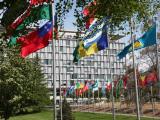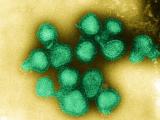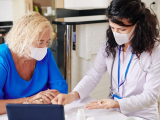(CIDRAP Source Osterholm Briefing) – By raising its pandemic alert level to phase 6 today, The World Health Organization (WHO) has put every continent, country, organization, and individual on official notice. The critical wake-up call has sounded; no more pressing the pause button.
During a press conference announcing the pandemic declaration, WHO Director-General Margaret Chan, MD, read the official, much-awaited statement and then answered questions from the media. Among her answers, Dr. Chan pointed out that we now face an "extremely unusual situation."
We have one influenza virus (novel H1N1) causing a pandemic of moderate severity, spreading worldwide and passing easily between people. At the same time we're watching another influenza virus (H5N1) that is capable of causing much more severe illness but, fortunately, still passes almost exclusively from birds to people and hasn't spread beyond Europe, Asia, and Africa.
Who predicted that scenario 5 years ago? No one. And who can predict what will happen next? Again, no one.
Be vigilant, be ready
And that's why two quotes from the WHO press conference today struck me as particularly salient:
- "Influenza viruses are full of surprises." – Dr. Chan
- "Influenza and pandemics are humbling." – Dr. Keiji Fukuda, WHO's assistant director-general for health security and environment
The good news is that we do know, have known, about the unpredictable nature of influenza. And now we have experienced what could be considered a dry run. The events of the past 5 weeks have poked holes in our existing preparedness plans and shown us what needs to be strengthened.
So what should your organization do now? I'd recommend the following steps:
1. If you haven't already done so, conduct a postmortem
Look at your organization's performance during the past 5 weeks, paying special attention to the period when information was changing rapidly. I covered this topic in my last column about lessons learned and yet to be learned and emphasized the importance of staying nimble. I've no doubt that the need for that quality became very apparent. But now you've got the weight of the WHO in your camp. Take advantage of the renewed interest and media attention. Now might be prime time to seek extra funding for preparedness efforts and supplies.
2. Hang on to any plans that are based on a severe scenario
The WHO no longer considers this pandemic the equivalent of a "mild to moderate" influenza season. The agency, much pressured to add severity levels to its alert phases, explained today that from a "global" point of view, the pandemic is of moderate severity.
But it added the caveat that severity varies from country to country and even hemisphere to hemisphere. In northern Manitoba, for example, one village of native people is being hit particularly hard.
If yours is a multinational organization, keep close tabs on each country, particularly if you rely on critical products and services from regions in the southern hemisphere, where H1N1 is edging out seasonal influenza strains. Remember that conditions could change in the time it takes to sneeze. Keep your eyes and options open. You might be able to prevent your organization from being humbled. And if you've kept your C-suite informed all along, your credibility may well have risen now that the official declaration has been made.
3. Don't base long-range decisions on what's happening now
Too much is unknown at this point. And while we aren't seeing the pandemic cause big changes in the world economy at the moment, what's happening now could be laying the groundwork for a more serious situation. Remember that the pandemic of 1918 started much the same way. We don't know if this is the first or last wave. We do know that we won't have a vaccine until late September or early October, and even then we may have to ration what's available in the United States for months to come. Most people in the developing world will never have access to the vaccine.
4. Encourage personal preparedness among your employees
Again, seize the opportunity that the WHO declaration is providing to remind your employees of how important individual preparation is. Do they have at least a 2-week supply of food, water, prescription medications, and other supplies to weather a wave of severe proportions? Check out the Employee Protection section of the CIDRAP Business Source Web site for a wealth of information.
Bottom line for business
You may have fought an uphill battle to prepare your organization for this day. Today's announcement validates your efforts. And while the pandemic is considered moderate right now, absolutely no one knows if it will stay that way. Your organization's leaders need to know that world leaders ask of them ongoing vigilance and continued preparation.



















